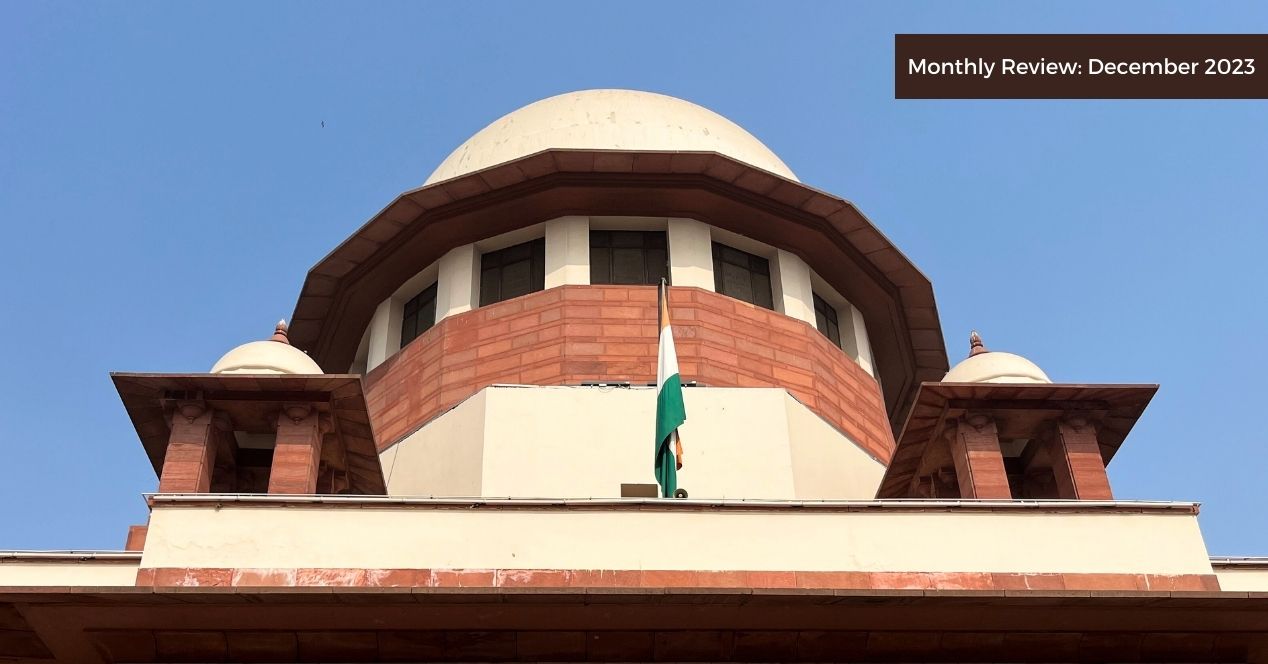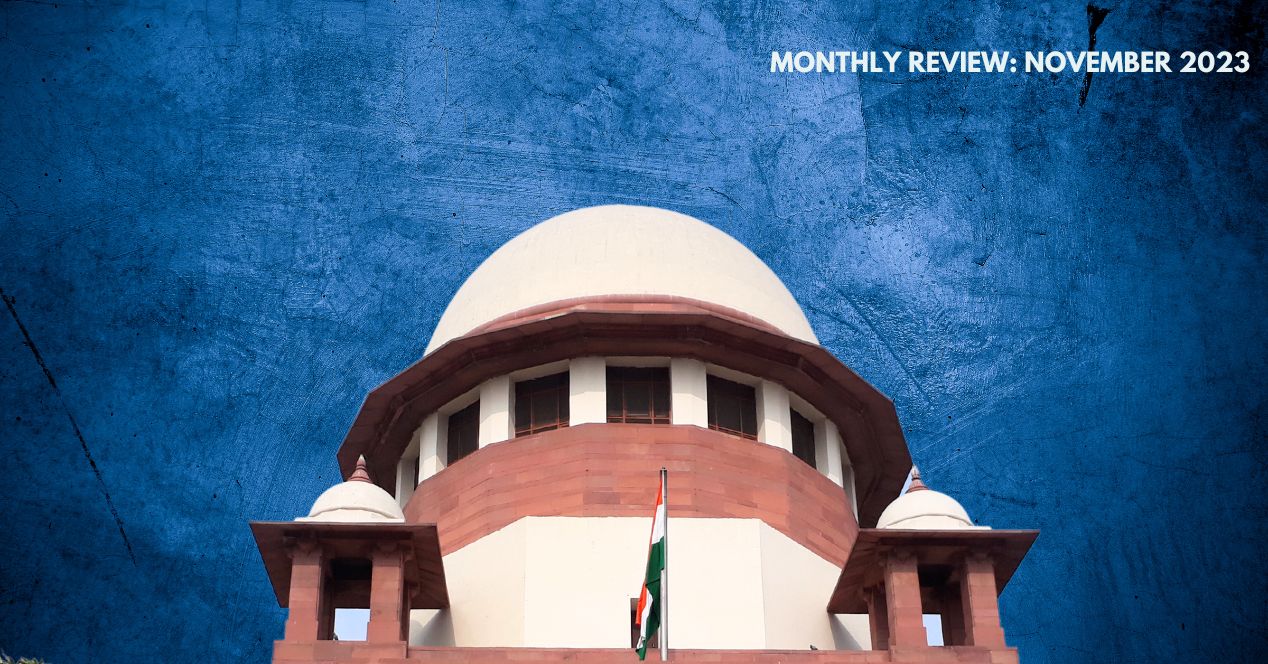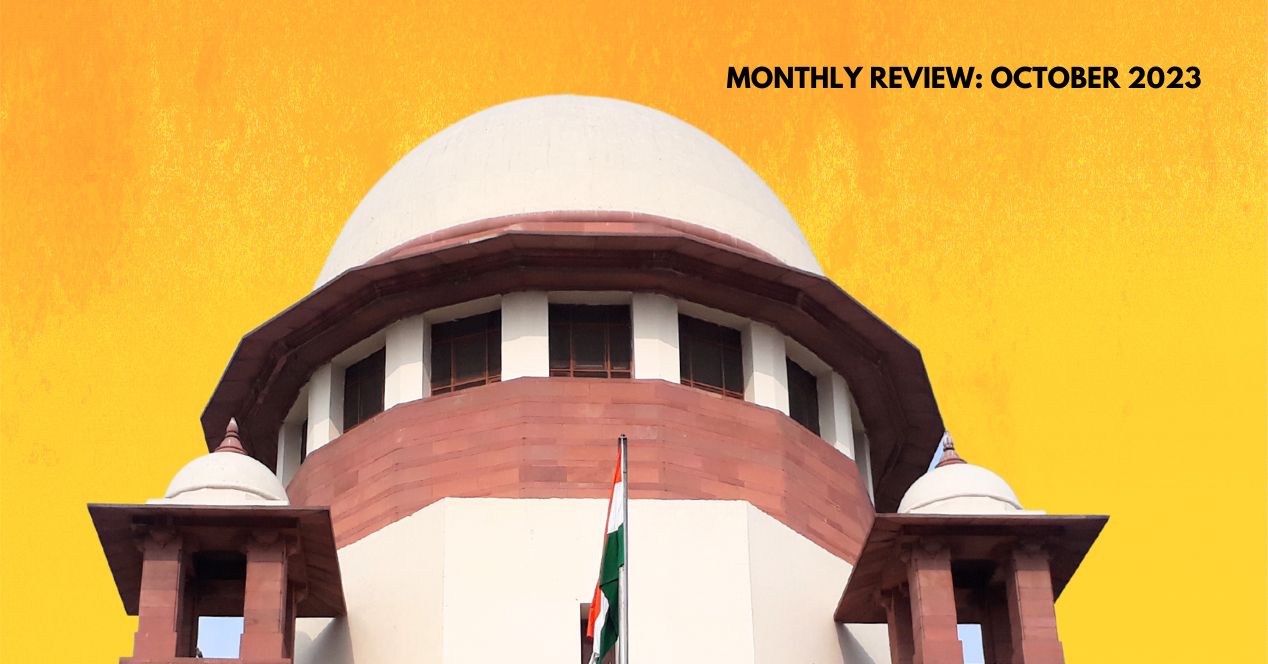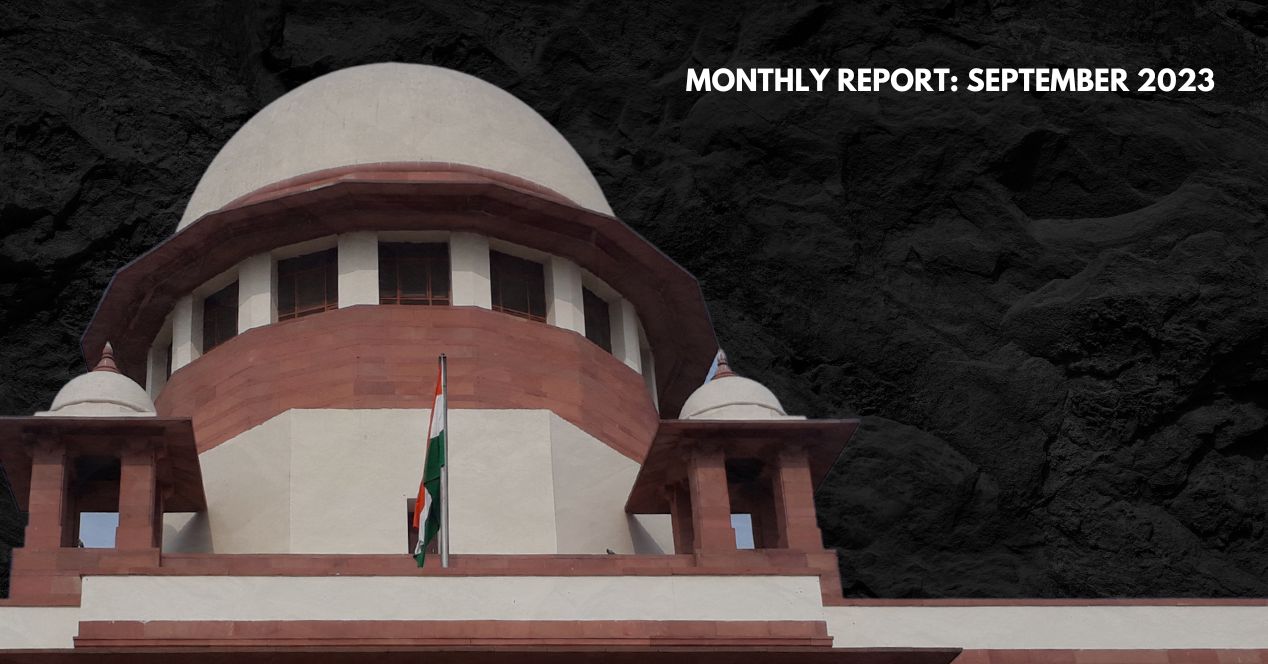Analysis
Monthly Review: January 2024
In January, the Supreme Court had a Constitution Bench hearing, delivered a judgement in the Bilkis Bano remission case, & appointed a judge
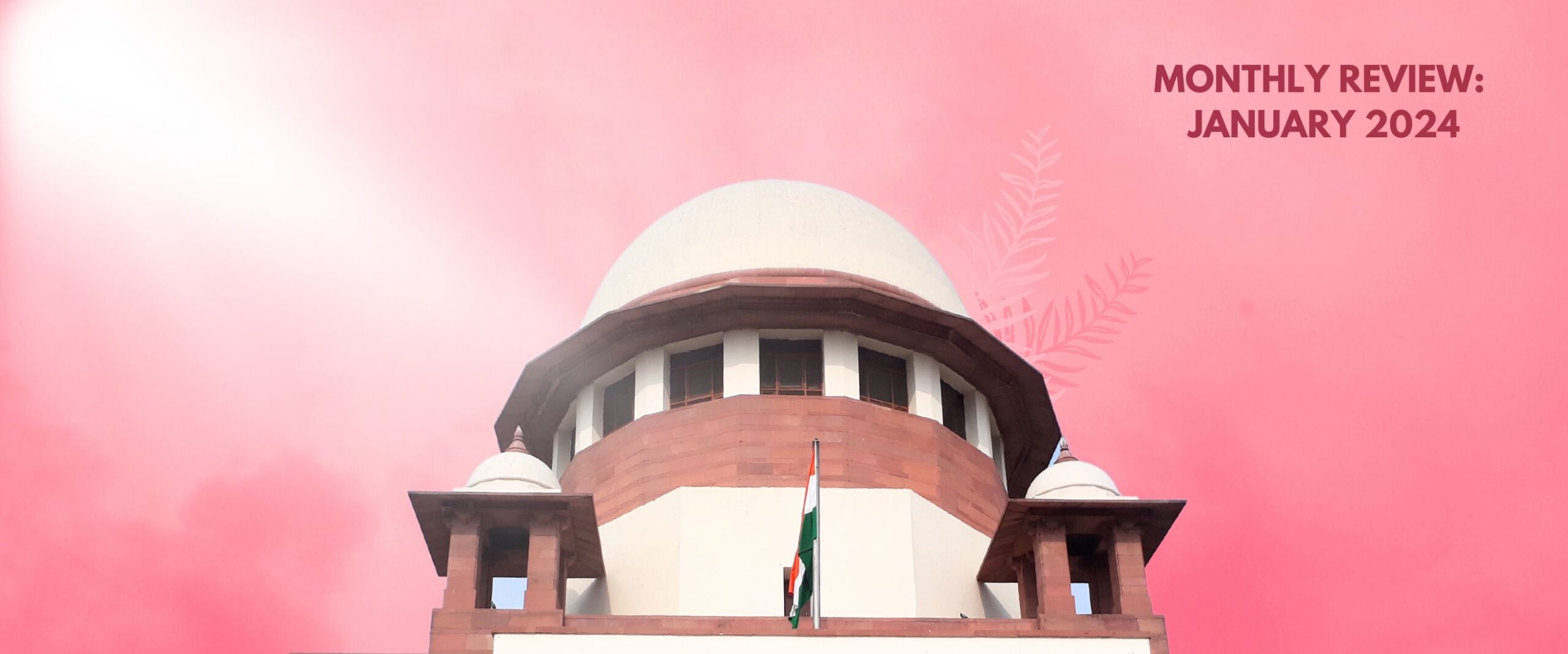
January 2024 was an eventful month for the Supreme Court. After a two week Christmas break, the Court resumed its functioning.
The events that stood out this year includes the judgement which set aside the remission order of 11 convicts in the Bilkis Bano gang rape case. Additionally, the first Constitution Bench hearing of the year was of seven-judges and dealt with the minority status of Aligarh Muslim University.
The Court also returned to its fully-sanctioned strength of 34 judges with the appointment of Justice P.B. Varale.
Determination of minority status of Aligarh Muslim University
In January, a seven-judge bench heard arguments on whether Aligarh Muslim University enjoys a minority status under Article 30 of the Constitution of India. Article 30 gives linguistic and religious minorities a fundamental right to establish and administer educational institutions of their choice. In 1967, a Constitution Bench in Azeez Basha v Union of India held that AMU was not a minority institution as it was neither established nor administered by Muslims but incorporated under the Aligarh Muslim University Act, 1920.
Petitioners argued that Azeez Basha will have undesirable consequences as it would result in all religious institutions losing their minority status under a statutory law. Petitioners also argued that Article 30 grants an absolute right to religious minorities to establish and administer institutions, which can be only restricted to ensure that /the educational institution meets a certain standard of quality.
Seven out of eight days of hearings completed in January.
Supreme Court Returned the Bilkis Bano convicts to prison
On 8 January 2024, a Division Bench of Justices B.V. Nagarathna and Ujjal Bhuyan held that the remission granted to 11 convicts in the Bilkis Bano gang rape case was illegal. The Bench ordered the convicts to return to prison within two weeks of its order. It chastised the Gujarat government for usurping the jurisdiction of the Maharashtra government and acting “in tandem” with the convicts. The 11 convicts requested an extension of time to surrender to prison for multiple reasons such as an ailing mother, and harvesting of winter crop. On 19 January 2024, the Bench rejected each request and held that none of the reasons provided by the convicts justified any extension as it did not prevent them from complying to the two week time frame provided by the Court.
Special Bench takes suo motu cognisance of conflicting Calcutta High Court orders
On 27 January 2024, a Special Bench suspended all ongoing proceedings at the Calcutta High Court relating to the issuance of fake caste certificates in West Bengal in medical admissions. This occurred after two conflicting orders were passed by the Calcutta High Court in that case where Justice Abhijit Gangopadhyay “ignored” an order of a Division Bench led by Justice Soumen Sen. In a shocking and rare turn of events, Justice Gangopadhyay alleged political bias and misconduct against Justice Sen.
The Special bench of the Supreme Court consisting of Chief Justice D.Y. Chandrachud, with Justices Sanjiv Khanna, B.R. Gavai, Surya Kant, and Aniruddha Bose will be hearing the case on 19 February 2024.
Border Security Forces Jurisdiction in Punjab
On 22 January 2024, the Supreme Court framed issues in a case filed by the Punjab government against the Union’s extension of the Border Security Force’s (BSF) jurisdiction in 2021. The extension of jurisdiction goes up to 50 kilometres from the international border within Punjab. The Supreme Court will examine whether the Union government unconstitutionally interfered with the policing of Punjab. Additionally, the maintainability of the petitions will also be considered. Arguments are expected to commence in April 2024.
Supreme Court considered framing guidelines for filling vacancies in Lok Sabha
On 8 January 2024, the Supreme Court set aside a Bombay High Court order which directed the Election Commission of India to fill a vacancy of the Pune Lok Sabha seat which had remained vacant since 29 March 2023, after the death of Member of Parliament Girish Bapat. The ECI relied on Section 151A of the Representations of Peoples Act, 1951, which states that a bye-election for filling the vacancy has to be carried out within six months. It has two exceptions: if the remaining Lok Sabha term from time of vacancy is less than one year, and if the ECI, in consultation with the Union government, certifies that it is difficult to hold an election within the six month time frame. Chief Justice D.Y. Chandrachud observed that the ECI must act with “alacrity” to promptly fill the vacant seats in the Lok Sabha.
No CBI probe in the Adani-Hindenburg Controversy
A Bench led by CJI Chandrachud refused to transfer a probe to look into the accusations of stock manipulation made by Hindenburg Research against the Adani group from the Security and Exchange Board of India (SEBI) to the Central Bureau of Investigation or a Special Investigation Team. It reasoned that such transfer could only be carried out if there is a glaring, willful, and deliberate inaction in carrying out the investigation by SEBI. It held that SEBI has carried out a “comprehensive investigation” without any “apparent regulatory failure.”
“Last opportunity” for submitting replies on petition seeking state-wise minority status
On 12 January 2024, a bench of Justices Sanjiv Khanna and Dipankar Datta directed that states which are yet to file replies in a petition seeking state-wise minority status must do so within six weeks. The petition filed by Ashwini Kumar Upadhyay stated that determining minority status on a national basis does not take into account the special demographic needs within a state. In Ladakh, Mizoram, and Lakshadweep, for instance, Hindus constitute less than 3 percent of the population. According to the petition, they would be unable to exercise fundamental rights available only to minorities under the Constitution in these states. The case will be heard in April 2024.
Institutional Changes
The Court achieved full strength of 34 judges in January with the appointment of Justice P.B. Varale. On 19 January 2024, the Supreme Court collegium recommended Justice Varale, keeping in mind that he is among the senior most judges from a Scheduled Caste. He was also the only Chief Justice of a high court from a scheduled caste community. On 24 January 2024, the Union appointed Justice Varale as a judge of the Supreme Court. He is the 15th Judge to be appointed under the collegium led by CJI Chandrachud. Our judge profile contains information about his life, education and career so far.
On the Supreme Court Observer website
On 22 January the Ayodhya Ram Mandir was consecrated. This historically, politically and constitutionally charged moment has a 500 year history that began when the Mughal King Babur constructed the Babri Masjid in 1528. Supreme Court Observer’s timeline traced the Ayodhya title dispute story setting context for the consecration of the temple. Our Desk Briefs (our email newsletters) that week were inevitably about this story. We wrote about how at the heart of this case that stirred violence, riots, political clashes and even death was a title suit—a debate over who had “possessory rights over a piece of immovable property.”
In January we also published a profile of Justice S. Ravindra Bhat, a “civil rights champion, ‘black letter’ judge, the man who shook up Indian Intellectual property jurisprudence.” Justice Bhat heard several significant constitutional cases during his tenure at the Supreme Court, including the challenges to the Maratha reservations and reservations for Economically Weaker Sections. He also heard the plea for marriage equality which was among the last judgements he delivered in his tenure as an SC Judge.
The Court reviewed a Standard Operating Procedure (SOP) prepared by Justice Rajiv Shakdher of the Delhi High Court while considering creating a set of guidelines for the use of virtual hearings in High Courts and tribunals lower Courts. This is a major step in the Indian Courts’ move towards modernisation. The biggest outcome from any measure taken to increase ease, speed and efficiency of virtual hearings and other technological developments in the Court will be to create ease of access for litigants. Our report on the submission of the SOP and the advice given to the Court by its amicus curiae details all the key considerations and the story so far.
In early January 2024, SCO published a series of thematic articles delving into key Supreme Court judgments of 2023 on topics such as Freedom of Speech, Bail, Democracy, Religion and Culture, and Federalism. Additionally, we published an in-depth exploration into the diversity of the Supreme Court, specifically on the social and regional backgrounds of the sitting Judges.
Our content also featured a listicle showcasing the top Constitution Bench decisions of 2023. Further, SCO’s analysed data on case institution and disposal rates in 2023, offers hope for a potential reduction in pendency in the future.
We published a response to an interview with Professor M.P. Singh written by Burhan Majid, Assistant Professor of Law at Jamia Hamdard, New Delhi regarding the Article 370 judgement. We also published an analysis by Zaid Deva, Lawyer, on the abrogation of Article 370 with a focus on the historical aspect of the judgement.
Additionally, SCO published interviews with Mathew John, Author of “India’s Communal Constitution,” and activists Anjali Bhardwaj and Amrita Johri from Satark Nagrik Sangathan. We also published an article by Abhinav Sekhri, Lawyer, who analysed the evolution of the Prevention of Money Laundering Act from a law made to capture illegal proceedings from smuggling of drugs to a tool to harass and threaten critics and farmers.

